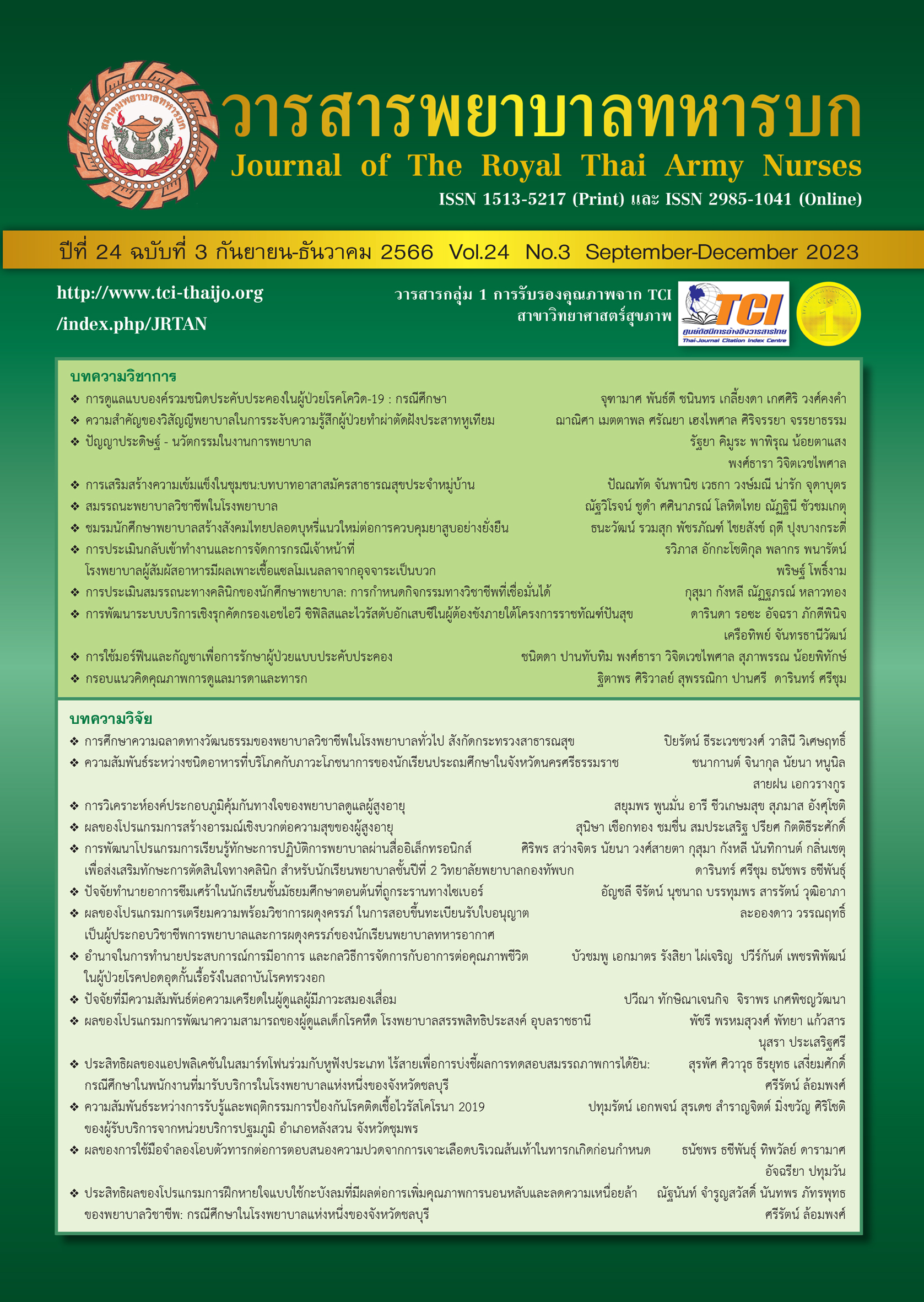Relationship of Stress to Adaptation of Village Health Volunteers during the COVID-19 Outbreak
Keywords:
Stress, adaptation, village health volunteers, COVID-19Abstract
This descriptive research aimed to determine the stress level and adaptation and the relationship between stress and adaptation of village health volunteers (VHV) during the outbreak of COVID-19. Objectives of the research to study the level of stress and the level of adaptation and the relationship between stress and adaptation among village health volunteers. The subjects were 110 village health volunteers recruited using multi-stage sampling. The research instrument was a questionnaire consisting of three parts: general information, stress assessment form, and adaptation questionnaire. The data were analyzed with descriptive statistics: frequency, percentage, standard deviation, and Pearson correlation coefficient. The research results revealed the overall stress level was low ( = 2.67, S.D. = 0.65). When classified into aspects, it was found that the highest stress level was the role of the duty which was at a moderate level (
= 2.89, S.D. = 0.79) and the overall stress adaptation level was high (
= 4.13, S.D. = 0.64). The relationship between stress and adaptation was at a high level (r = 0.83) with statistical significance (p<.05). The research results indicate that village health volunteers are an important healthcare team. Therefore, when there is a new epidemic occurs, related healthcare organizations should realize that adaptation and stress management are required for quality of work life.
Downloads
References
Emergency Operations Center, Department of Disease Control. Situation report of Coronavirus disease 2019. Issue 507, 2021. (in Thai)
Nakhon Pathom Provincial Public Health Office. Situation of COVID-19 in the area of Nakhon Pathom Province. 2021. (In Thai)
Sangsirilak A., & Sangsirilak S. Stress and Depressed Mood in Healthcare Workers During COVID-19 Outbreak. The Journal of the psychiatric association of Thailand. 2020; 65(4): 400-8 (In Thai)
Suratana S., Tamornpark R., Apidechkul T., Srichan, P., Mulikaburt, T., Wongnuch, P., ... & Udplong, A. Impacts of and survival adaptations to the COVID-19 pandemic among the hill tribe population of northern Thailand: A qualitative study. Public Library of Science ONE .0252326. 2021; 16 (6), (In Thai)
Sadangharn P. Work from Home Adaptation of Employees in the Eastern Economic Corridor During the Covid-19 Crisis. Burapha Journal of Business Management, Burapha University. 2020; 9 (2), 14-33. (In Thai).
Roca J., Canet-Vélez O., Cemeli T., Lavedán A., Masot O., & Botigué T. Experiences, emotional responses, and coping skills of nursing students as auxiliary health workers during the peak COVID-19 pandemic: A qualitative study. International Journal of Mental Health Nursing. 2021; 30(5), 1080-92.
Department of Health Service Support. Knowledge of Coronavirus Disease 2019 (COVID-19) for medical personnel and public health volunteers. 2021 Nonthaburi. (In Thai)
Khon Kaen Ratchanakarin Psychiatric Hospital, Department of Mental Health. A handbook for caring for people’s hearts for community leaders and village Volunteers. 2023 (In Thai)
Kan F. P., Raoofi S., Rafiei, S., Khani S., Hosseinifard H., Tajik F.,... & Ghashghaee A. A systematic review of the prevalence of anxiety among the general population during the COVID-19 pandemic. Journal of affective disorders 293. 2021; 391-98
Bareeqa S. B., Ahmed S. I., Samar S. S., Yasin W., Zehra S., Monese G. M., & Gouthro R. V. Prevalence of depression, anxiety and stress in china during COVID-19 pandemic: A systematic review with meta-analysis. The International Journal of Psychiatry in Medicine. 2021; 56 (4), 210-27.
Wuttaphan N. Factors Influencing the Work Behavior of Village Health Volunteers During the COVID-19 Pandemic in Thailand: A Cross-Sectional Study. Journal of Population and Social Studies. 2022; 30, 816-33. (in Thai)
Arpornkul N., & Suppapitiporn S. Adjustment problems of first year medical students. Chulalongkorn Medical Journal. 2017; 61(5), 631-45. (In Thai)
Daly M., & Robinson E. Psychological distress and adaptation to the COVID-19 crisis in the United States. Journal of psychiatric research. 2021; 136, 603-9
Morales-Vives F., Dueñas J. M., Vigil-Colet A., & Camarero-Figuerola M. Psychological variables related to adaptation to the COVID-19 lockdown in Spain. Frontiers in Psychology 11, (2020): 565634.
Roy S.C. The Roy adaptation model. 2nd ed. Stamford, CT: Appleton & Lange. 1999.
Sansupha P. Adaptation of students in the situation of COVID-19. MCU Journal Humanities Review Year; (In Thai)
Waelveerakup W, Suwannasarn k, Pasuwan D, Quality of life of Older Persons During the Second Wave of the COVID-19 Pandemic in Thailand. Journal of The Royal Thai Army Nurses. 2023; 24(2): 76–87. (In Thai)
Usher K., Jackson D., Durkin, J., Gyamfi, N., & Bhullar, N. Pandemic-related behaviours and psychological outcomes; A rapid literature review to explain COVID-19 behaviours. International Journal of Mental Health Nursing, 2020; 29(6), 1018-34.
Downloads
Published
How to Cite
Issue
Section
License
Copyright (c) 2023 Journal of The Royal Thai Army Nurses

This work is licensed under a Creative Commons Attribution-NonCommercial-NoDerivatives 4.0 International License.
บทความหรือข้อคิดเห็นใดใดที่ปรากฏในวารสารพยาบาลทหารบกเป็นวรรณกรรมของผู้เขียน ซึ่งบรรณาธิการหรือสมาคมพยาบาลทหารบก ไม่จำเป็นต้องเห็นด้วย
บทความที่ได้รับการตีพิมพ์เป็นลิขสิทธิ์ของวารสารพยาบาลทหารบก
The ideas and opinions expressed in the Journal of The Royal Thai Army Nurses are those of the authors and not necessarily those
of the editor or Royal Thai Army Nurses Association.






